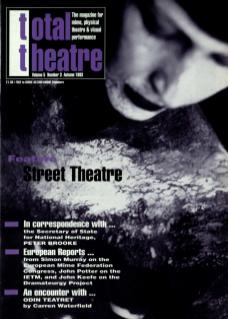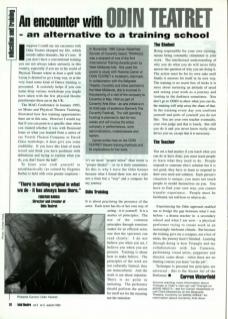I suppose I could say my encounter with Odin Teatret changed my life, which sounds rather dramatic, but it's true. If you don't have a conventional training you are not always taken seriously in this country, especially if you are in the world of Physical Theatre where at least a spell with Lecoq is deemed to go a long way, or at the very least some kind of Dance training is presumed. It certainly helps if you can name drop various workshops you might have taken with the few physical theatre practitioners there are in the UK.
The MAG Conference in January 1993, on Mime and Physical Theatre Training, illustrated how few training opportunities there are in this area. However, I would say that if you can point to a specific time when you trained, whether it was with Desmond Jones or what you learned from a series of say Trestle Theatre Company or David Glass workshops, it does give you some credibility. If you have this kind of track record and think you have problems with definitions and trying to explain what you do, you don't know the half!
To learn your craft yourself or auto-didactically (as coined by Eugenio Barba) is held with even greater suspicion – it's no more ‘proper mime’ than mime is ‘proper theatre’, or so it feels sometimes. So this is why I wave the Odin banner because what I found there was not a style nor a form but a ‘way’ and a compass for my journey.
Odin Training
It is about practising the presence of the actor. Each actor has his or her own way of acting – it is yourself. It is a matter of principles. The use of the common principles through exercises makes for an efficient actor, one that the spectator can read clearly: I do not believe you when you act, I believe you when you are present. Training is about how to make believe. The principles of the work are not culturally limited, they are transcultural. And the work is not about imitation. There is no point in imitating. The performer should perform the action for itself, not for the meaning nor the imitation.
The Student
Being responsible for your own training means being constantly stimulated in your work. The intellectual understanding of why you do what you do will never fully answer the question of why you are doing it. The action must be for its own sake until finally it answers for itself in its own way. The training is no secret box of tricks; it is more about nurturing an attitude of mind and seeing your work as a journey and trusting in the darkness sometimes. You don't go to Odin to show what you can do; the training will strip away the sham of that. In the training every day you confront yourself and parts of yourself you do not like. You are your own teacher eventually, your own judge, and that is lonely. But still you do it and you never know really what drives you on, except that it is necessary.
The Teacher
You are a bad teacher if you teach what you can do or have done; you must teach people to learn what they need to do. People respond to someone else's solution but it is not good; they have to learn to respond to their own need and solution. Each person's situation is unique, you must not teach people to model themselves on you. You have to find your own way, you cannot transfer experience. People must be facilitated, not told how or what to do.
Experiencing the Odin approach enabled me to bridge the gap between what I was before – a drama teacher in a secondary school – and what I am now, a physical performer trying to create work in an increasingly intolerant climate. But because the training gave me a compass, not a box of tricks, the journey hasn't finished. Learning through doing is how Triangle and my collaborations with Ian Cameron, performing visual artist, puppeteer and director, came about – when there are no training courses you learn ‘on the job’.
Technique is personal but principles are universal – this is the Secret Art of the Performer.

